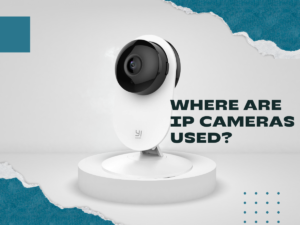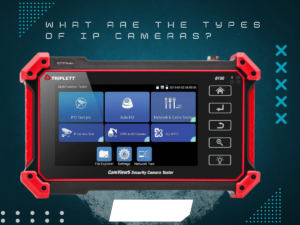Introduction
In today’s fast-paced world, security and surveillance have become increasingly important. Whether you want to keep an eye on your home while you’re away or monitor your business premises for added safety, IP cameras have emerged as a reliable solution. But what exactly is an IP camera, and how can it benefit you? In this informal blog post, we’ll delve into the world of IP cameras, exploring their uses, types, must-have features, and much more. So, let’s jump right in!
Where are IP Cameras Used?

IP cameras, short for Internet Protocol cameras, find applications in various settings. They are commonly used in:
- Home Security
- Keep an eye on your property, loved ones, and pets when you’re not at home.
- Business Surveillance
- Monitor your workplace, deter theft, and enhance employee safety.
- Traffic Management
- Capture real-time traffic data and improve road safety.
- Industrial Monitoring
- Keep track of machinery and processes in industrial environments.
When it comes to IP cameras, there are several types to choose from, each catering to specific needs:
- Bullet Cameras
- Known for their sleek, cylindrical shape, perfect for outdoor use.
- Dome Cameras
- Discreet and vandal-resistant, suitable for indoor and outdoor surveillance.
- PTZ Cameras
- Pan, tilt, and zoom capabilities for flexible monitoring.
- Wireless IP Cameras
- Easy installation and flexibility in camera placement.
What are the Must-Have Features of IP Cameras?
To ensure you get the most out of your IP camera, consider these essential features:
- High-Resolution Imaging
- Crisp, clear video quality for accurate surveillance.
- Night Vision
- Infrared LEDs for visibility in low-light conditions.
- The feature of motion detection notifies you when any movement is detected within the camera’s field of view. It keeps you alerted by sending instant alerts in case of any such activity.
- Two-Way Audio
- Allows for communication through the camera.
What are the Extra Features of IP Camera Systems?
While the must-have features are crucial, some additional features can further enhance your surveillance system:
- Mobile App Integration
- Monitor your IP cameras remotely via smartphone apps.
- Cloud Storage
- Store footage securely in the cloud for easy access.
- Facial Recognition
- Identify individuals and enhance security.
What to Consider When Buying an IP Camera?
Before purchasing an IP camera, consider factors like your specific needs, budget, and installation requirements. It’s crucial to select the right camera for your unique situation.
How do networked IP cameras work?
IP cameras connect to your network, allowing you to access their live feeds and recordings remotely. However, it’s vital to ensure network security to prevent potential hacking attempts.
What is an IP Camera?
An IP camera is a digital surveillance device that captures and transmits video and audio data over an internet connection. It provides a high level of flexibility and accessibility, making it a popular choice for security and surveillance purposes.
How can SafeSite Facilities help?
SafeSite Facilities offers a range of IP camera solutions designed to meet your security needs. Their expertise ensures you get the best surveillance system for your home or business.
Are IP cameras CCTV?
Yes, IP cameras can be considered a part of CCTV (Closed-Circuit Television) systems. However, unlike traditional analog cameras, IP cameras use digital technology to transmit data.
What does an IP camera do?
An IP camera records video and audio, which can be viewed remotely over the internet. It serves as an effective tool for surveillance and security.
How do I know if my camera is an IP camera?
Check the camera’s specifications and features. IP cameras typically have an Ethernet port for network connectivity and support internet-based access.
How do IP cameras get power?
IP cameras can be powered through an electrical outlet, Power over Ethernet (PoE), or rechargeable batteries, depending on the camera’s design.
Can I connect an IP camera directly to a PC?
Yes, you can connect an IP camera directly to a PC using a network cable or through Wi-Fi, depending on the camera’s connectivity options.
Can IP cameras work without the internet?
Yes, IP cameras can function on a local network without internet access. However, internet connectivity is necessary for remote monitoring and access.
IP cameras have transformed the way we think about security and surveillance. They have revolutionized the way we monitor our surroundings, making it more efficient, effective, and reliable. In conclusion, their impact has been immense, and they continue to play a significant role in ensuring safety and security in various settings. Their versatility, high-quality imaging, and remote access capabilities make them a valuable asset for both homes and businesses. When choosing an IP camera, it’s crucial to assess your unique requirements and budget in order to find the perfect solution.
FAQ’s
Is an IP camera the same as a webcam?
No, IP cameras are standalone devices designed for surveillance, while webcams are typically used for video conferencing and live streaming.
Are IP cameras difficult to install?
Not necessarily. Many IP cameras are designed for easy DIY installation, while others may require professional setup.
Can IP cameras record audio as well as video?
Yes, many IP cameras come equipped with microphones for audio recording.
Do I need a subscription for cloud storage with IP cameras?
Some IP camera manufacturers offer free cloud storage options, while others may require a subscription for extended storage capacity.
What is the lifespan of an IP camera?
The lifespan of an IP camera can vary depending on its quality and usage, but a well-maintained camera can last for several years.

